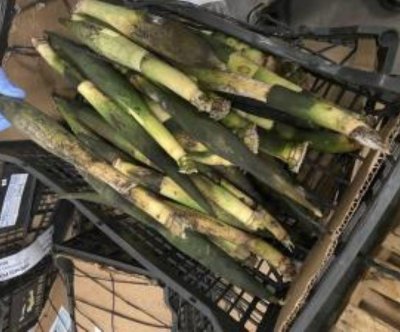Customs Agents Uncover Invasive Fungi on Flower Stem Imports

Invasive fungi on flower stems imported from Guatemala through the George Bush International Airport in Houston caused a stir recently for Customs and Border Protection agents. The fungi, which infects a wide variety of hosts causing plant disease in important crops worldwide, is cause for alarm and could affect the quality of foodstuffs available to the American consumer.
The U.S. Department of Agriculture forecasted an 18% drop in yield for the 2022-2023 season for the nation and a 51% drop for Florida. This could potentially be attributed to the presence of the invasive fungi found on the flower stems shipped from Guatemala. The drop in yield means that orange juice producers will have to turn to imports to meet demand, and thus prices are expected to rise.
In response to the discovery, CPB officers quarantined and destroyed the shipment and those offloading the shipment were required to take part in a biosecurity training program.
In order to prevent this from happening again, CPB has implemented additional security procedures and protocols. All agricultural shipments from high-risk areas are held up for investigation to check for pests and diseases that could damage crops and disrupt the food supply. Officers also use advanced technologies, such as closed-circuit television cameras, to monitor the environment for signs of contamination.
At the same time, Customs and Border Protection works closely with the U.S. Department of Agriculture in order to identify potentially dangerous plant threats. Additionally, the USDA has quarantine programs in place for imports from high-risk countries that allow them to inspect and test shipments before they are allowed into the country. This helps to ensure the safety of our food supply and protect consumers from any potential harm.
To reduce the likelihood of an invasive species being brought into the United States, consumers should be sure to only purchase products that are certified by the U.S. Department of Agriculture. This certification ensures that the product has been inspected and deemed free from contaminants, and that it is safe to consume.
In summary, the discovery of invasive fungi on flower stems imported from Guatemala is a cause for concern. It is important for everyone to be aware of the potential risks so that we can all do our part to protect the food supply and keep the prices of food products competitive. Customs and Border Protection has taken additional steps to prevent this from happening again, such as implementing additional security procedures and protocols, and working with the USDA to identify and inspect potentially dangerous plants. Finally, be sure to always purchase products that have been certified by the USDA.